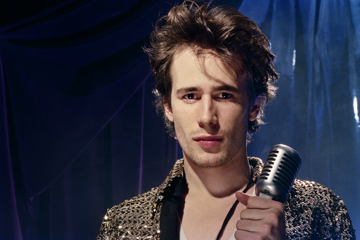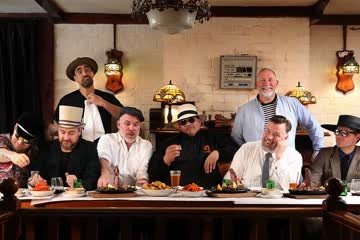Malthouse’s ‘My Dearworthy Darling’ Interrogates Who We Allow To Speak In Public
Writer Alison Croggon and The Rabble’s Emma Valente speak to Hannah Story about finding inspiration in the voices of women medieval mystics.
My Dearworthy Darling, a collaboration between poet, playwright and critic Alison Croggon and experimental theatre makers The Rabble – aka Emma Valente and Kate Davis – tells the story of one woman set across two time periods: the modern and the medieval.
The lead, played by Jennifer Vuletic, is known only as Woman – and she’s having a breakdown, as other voices butt their way into her consciousness.
Director Emma Valente calls the work an “epic, spiritual journey” and explains that it moves fluidly between the two times and spaces, not beholden to any of the pressures of a period piece: “The representations of both the contemporary and the historical setting are quite abstract and quite surreal.”
Both Croggon and Valente speak warmly about each other’s work, their practices easily aligning with one another’s.
Alison Croggon has long admired The Rabble’s work as theatre makers. “I suppose it makes sense for someone, if you're a poet, to work with people who make poetic theatre. That's what I've always liked about the theatre [The Rabble] make, it's poetic and its sense is drawn from emotional sense – [from] emotional and metaphorical connections.”
Valente describes the collaboration as “exciting” and complementary: “I guess we are always looking for our work to contain and hold metaphor and also multiple meanings at any given moment. And I think Alison's poetry does that in a very similar way to the way our visuals work.”
Don't miss a beat with our FREE daily newsletter
The Rabble usually devise their own shows, so working with a script was something of a novelty for the pair. But they still brought their improvisational methodology to the play.
After reading Croggon’s text, “we would improvise or devise on the floor with no text, and just looking at the kind of physical shapes”, Valente explains. “And then we would put the text back on top of that.”
The process for Croggon has seemed “very meticulous and detailed, and at the same time remarkably free”: “There's this sense that they – Kate and Emma – create a space which feels very safe, which then allows everyone within it to bring everything they have to it. It's a feminist space.”
Croggon says she’s been obsessed with women medieval mystics, like Margery Kempe of 14th century England, for about 15 years. She describes their writing as “powerful”, “amazingly poetic” and often “incredibly erotic”. She’s fascinated by the way they “formed a new way of writing but in a subjective state”.
“I suppose as a poet what interests me most of all is they're trying to talk about things that there aren't any words for, that are not expressible in language,” Croggon concludes. “And that's a very interesting thing for a poet to think about.”
Historically, Croggon says, these women’s visions were often dismissed as a kind of madness or general illness – perhaps a manifestation of hysteria or sexual frustration. But Croggon disagrees with that kind of narrow interpretation.
“The more I read, the more I sort of thought, 'Oh, it's more complicated than that.' There is this sense of women instating themselves in these voices.”
“I think the piece treats the idea of spirituality or the idea of faith with a lot of honour and understanding,” Valente adds, “and does not diagnose this Margery, the medieval mystic, with a mental illness as a lot of historians are wont to.”
“A lot of people are excited to diagnose these women with something,” she continues. “I think we [sometimes] choose to sort of make them fit into our contemporary understanding of the world. And we actively choose not to [do that] and we actively choose to allow the relationship with a god or a being greater than to have the potential to be real.”
Being a woman medieval mystic could in fact be “empowering”, Croggon notes, because, when they took on God’s authority, these women were able to “speak in public at a time when women, in some places, they couldn't even give evidence in court”.
Valente affirms Croggon’s take on the opportunity being a mystic afforded women to “speak in public and to have their voices heard”.
In My Dearworthy Darling, those voices – performed by a chorus of Monash University students – are a means of empowerment too. “The voices kind of arrive and help her find a way to become more herself,” Croggon explains, “outside a whole lot of pressures that are circling around her.”
That idea of women being empowered to speak feels pertinent for our times – when we’re just now gathering the courage to speak out against say widespread workplace sexual harassment, including on our theatre stages.
For Croggon, that idea of women being able to express what they may have formerly kept quiet is “rifted through” her text. Ideas around “female authority, and what is granted and what is considered to be a legitimate voice” is not overtly articulated in My Dearworthy Darling. Still, “it’s certainly one of the things that's driving the whole show”, she says.
Valente is more cautious about how far we’ve come in creating space for women – and minorities – to finally be heard.
“I think that we are at the very beginning of women and minorities feeling like it is possible to speak out against all kinds of things,” Valente begins, “against the way a very hierarchical and patriarchal society has treated people who are seen as less or different.
“But we are often still punishing people who do. When people speak out, it is at great risk and potential cost still, and I feel like we're just at the start of a moment and we haven't really worked out how to protect the people who choose to speak up.”







